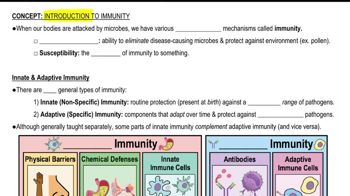Mark the following statements as true or false. If a statement is false, correct it to make a true statement.
e. Clusters of MALT located around the oral and nasal cavities are known as Peyer's patches.
 Verified step by step guidance
Verified step by step guidance



Mark the following statements as true or false. If a statement is false, correct it to make a true statement.
e. Clusters of MALT located around the oral and nasal cavities are known as Peyer's patches.
Fill in the blanks: The lymphoid organ that filters the blood is the ______, and the lymphoid organ that filters the lymph is the______.
Terrence has severe asthma and allergies, and is placed on a medication that blocks the functioning of IgE. How would this medication alleviate his symptoms?
Mr. White developed neutropenia as a consequence of cancer chemotherapy, which destroyed much of his bone marrow. What other components of the immune system would be harmed by bone marrow destruction? Would you expect his hematocrit to be elevated or decreased? What effects would you expect to see from this change in hematocrit? (Connects to Chapter 19)
Which of the following make up the body's first line of defense?
a. Surface barriers
b. Cells and proteins of adaptive immunity
c. Cells and proteins of innate immunity
d. All of the above
The chemotherapeutic drugs Mr. White is taking affect all cells that undergo rapid mitosis, such as those of the skin. What effect would this have on the functions of the skin? How could this affect his immunity? (Connects to Chapter 5)